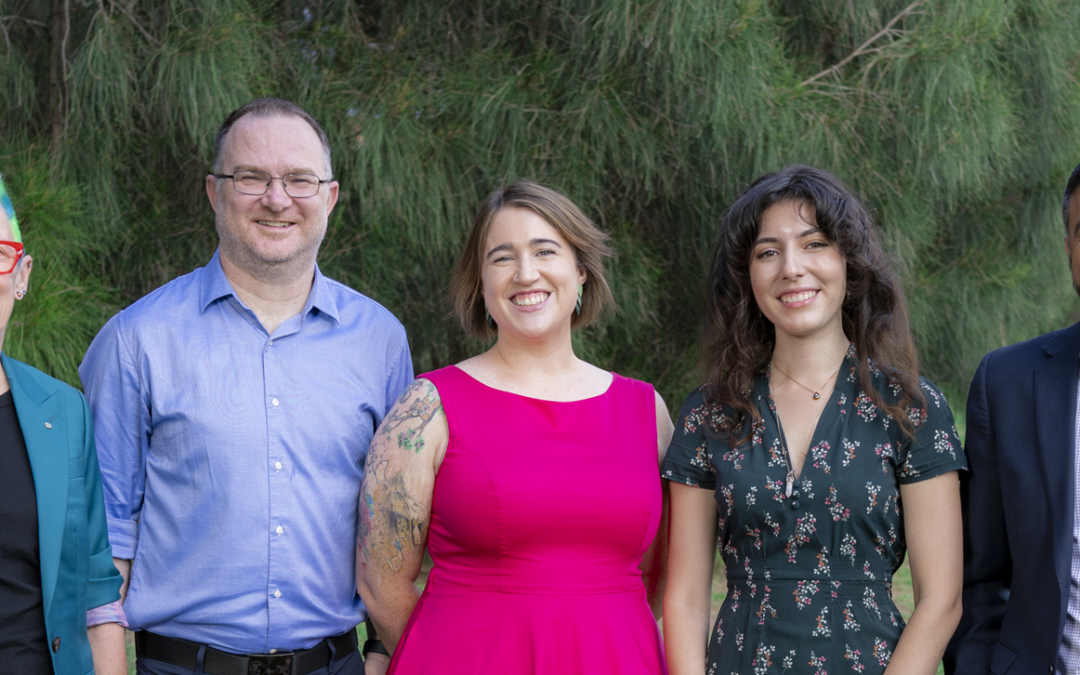Making Council a Climate Leader
Green energy for the Inner West
The Greens acknowledge that climate change poses one of the greatest threats to our world in human history, and urgent local, national and global action is required now to ensure a safe climate. We commit to implementing ambitious actions to help mitigate climate change and we will work to make our local communities increasingly resilient. Climate emergency planning touches all areas of the Inner West Council operations, and will be considered in every decision we make.
We commit to:
- Lead by example to ensure Inner West Council operations are carbon neutral by 2025 and Council has a net zero reduction target of 75% by 2030.
- Improve energy efficiency of all council buildings, and install solar panels on all council buildings and car parks.
- Transition council buildings and swimming pools away from gas.
- Develop a new Local Environment Plan to ensure all new buildings meet sustainability targets
- Encourage and enable sustainable transport by council staff.
- Transition the council’s vehicle fleet to electric, and make sure they are run by 100% renewable energy.
- Ensure that council’s investments, banking and procurement services do not support companies involved in the extraction, processing or trade of fossil fuels.
Reduce transport emissions by:
- Creating walkable neighbourhoods.
- Prioritising improvements to cycling and pedestrian facilities (see the Inner West Greens Active Transport Policy 2021).
- Encouraging and supporting the uptake of electric vehicles (see the Inner West Greens Electric Vehicle Policy 2021).
- Encouraging localised living through planning decisions.
- Supporting the local sharing economy and event creation to reduce transport emissions related to the shipping of goods.
Renewables uptake
- Provide information, pathways and solutions that enable all residents, businesses and organisations to move towards a zero carbon future, through viable energy efficiency and renewable energy uptake.
- Support the installation of resilient community-scale grid systems, including battery storage.
- Support mechanisms to facilitate solar installation and improved building efficiency for rental properties and apartment buildings.
- Ensure continued funding to community groups and NGOs that support the uptake of renewables.
Advocate to the state government to:
- Close all coal-fired power stations.
- Introduce a moratorium on onshore conventional gas.
- Support the development of large and small-scale renewable power sources, including locally distributed power schemes.
- Mandate and enforce more ambitious environmental standards for all new residential and commercial developments, including renewable energy and efficiency requirements, green space, water, waste and recycling.
Other actions
- Address urban heat island effect by increasing green spaces, tree canopy and green roofing (see the Inner West Greens Tree Canopy Policy 2021)
- Ensure that climate action is diligently undertaken as a matter of urgency, and that the Inner West Council places climate at the centre of all decision making.
- Support community-led action on climate change, including both climate-friendly community initiatives and activism supporting stronger climate action.
A Green Inner West: Our tree Canopy
Two years ago Council changed the Tree Management Development Control Plan to permit easier removal of trees within 2 metres of a dwelling house or garage The result has been a reduction of 20 hectares in canopy on private land. Despite an increase in canopy on public land by 6 hectares in the past year, this means the Inner West tree canopy is decreasing and is now at 17.36%, below the city wide average of 23%. A 10% increase in tree canopy reduces the land surface temperature by 1.13 degrees Celsius, supports cleaner air and water, and provides local habitat.
Greens councillors will work to:
- Ensure the Inner West Council achieves the tree canopy targets included in Clause 1 of the Tree Management Development Control Plan (Tree DCP) by 2030 in line with the NSW Government target.
- Require reporting on progress in achieving those targets.
- Amend the Tree DCP to remove the automatic approval of removal of a tree within 1 metres of a dwelling house located within the same lot as the tree (Tree DCP C6.5).
- Require appropriate decisions about whether trees close to a dwelling are able to be removed. While this will take into account proximity, approval will not be automatic. Permission will be granted for genuine problem trees based on the criteria in the Tree DCP.
- Require consultation with neighbours before removal of a tree whether on public or private property.
- Ensure that the “preference” for mature replacement trees is implemented.
- Ensure all trees planted by Council are locally endemic trees, and this is also encouraged on private property.
- Have Inner West Council provide at cost or subsidised advice on tree removal and pruning to residents who can’t afford to get their own advice.
- Have Council provide free advice to residents on selecting trees and shrubs for their gardens which are suitable for the area and which attract and support wildlife and insects.
- Identify areas of concrete which can be replaced with native gardens.
- Require Ausgrid to insulate its wires where trees are impacted so as to ensure pruning of trees is not required to protect electricity supply.
- Ensure the doubling of the tree planting budget continues in future years and apply for all available grants for tree planting from the NSW Government.
- Implement the Significant Tree Register
- Encourage more green roofs and walls in the Inner West
Active transport policy
We commit to:
Walkable suburbs
- Improve amenities to enable safer and more accessible walking, including more drinking fountains/water refill stations, shade trees, seating, bins, dog facilities, shelter, appropriate lighting, public toilets and accessible crossings
- Improve signage including street signs, directions and distances, historical sites, places of interest and local amenities
- Audit footpaths for accessibility with an aim to remove uneven surfaces and obstructions, provide ramps, and widen narrow paths where practicable
- Improve and increase pedestrian crossings and refuge islands in high pedestrian areas to increase safety
- Work with the State Government to prioritise pedestrians by introducing pedestrian scramble at busy intersections, automate pedestrian lights where appropriate and increase pedestrian walk time
- Implement 30km/h speed limits and traffic calming measures on residential local streets, main streets and school precincts to create low traffic neighbourhoods (LTNs)
Bicycle friendly Inner West
- Implement a dedicated budget for active transport, including capital spending, dedicated personnel and surface maintenance/upgrades
- Fully fund and complete the Inner West Council Bicycle Strategy by 2022
- Support the creation of an Inner West bicycle network map that includes connections to neighbouring municipalities, identifying missing links
- Create a continuous, connected and direct bicycle network, including completion of the Greenway, the City West Cycle Link and an East West link connecting Croydon to Petersham – Newtown cycleway, a Balmain Road Cycleway and feasibility study for Iron Cove Creek cycleway
- Implement separated cycleways for council roads with heavy traffic, and advocate to State Government to do so for arterial state roads
- Embed dedicated staff with focus on bicycle infrastructure in appropriate traffic teams
- Where possible, provide cycleways separate from pedestrian paths and make crossings that allow pedestrians and cyclists to cross at the same time
- Put pedestrian and bicycles first when developing transport and infrastructure projects as per IWC Integrated Transport Plan’s hierarchy
- Fund free, accessible learn to ride classes for all members of the community, and provide bicycle service pop up tents throughout the Inner West LGA
- Investigate parking reduction on main streets to allow for provision of bike lanes
- Increase covered, secure bicycle parking in shopping areas, near schools, services and childcare centres, including for cargo and electric bikes
- Work with rideshare companies to ensure helmets are always provided and there are adequate drop zones near new developments and busy precincts
- Provide subsidised rideshare membership or public transport fares for residents who forego parking provision
- Ensure ample bicycle facilities are integrated into new developments
- Conduct media campaign to promote cycling by encouraging residents to ride bikes for local trips and promoting new safer cycling infrastructure
Electric vehicles for the Inner West
The Inner West Greens acknowledge that transport is Australia’s third largest source of greenhouse gas emissions, accounting for 17 percent of total emissions, with the highest rate of growth. Approximately 11% of the council’s emissions come from transport. As such it is imperative that the Inner West Council transitions its fleet to Electronic Vehicles, as well as encourages and enables community uptake of EVs.
We commit to:
- Install EV charging infrastructure for council operations and public use – in the council depots, car parks and on-street parking bays.
- Encourage and support the uptake of EVs by residents.
- Address EV charging needs of residents without off-street parking
- Identify state government funding to enable the transition of the Inner West Council’s fleet to EVs.
- Use planning controls to incentivise and enable EV charging infrastructure within all new developments.
- Identify and streamline planning approval to allow EV charging infrastructure to be retrofitted into existing buildings.
- Work with local car share companies and fleet owners to investigate ways in which to transition their fleets to EVs.

